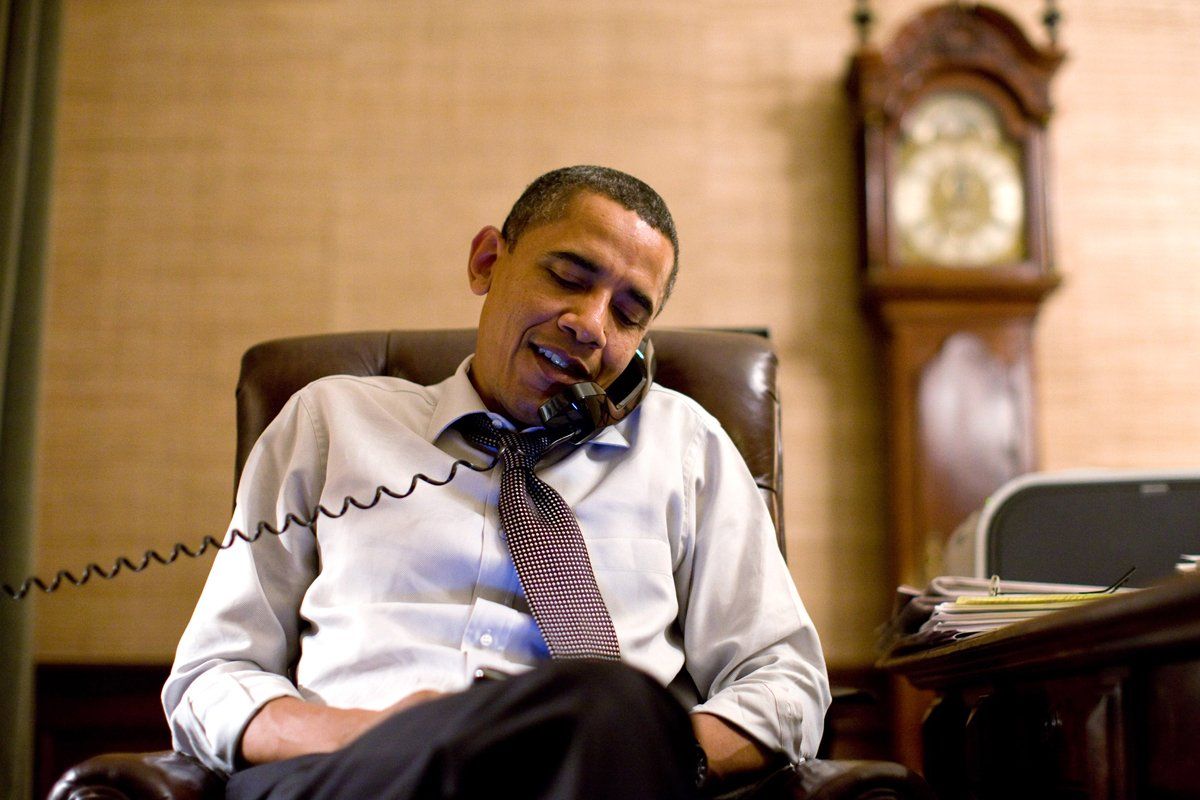
It's often darkest just before it's … pitch black. But other times a dim ray of something resembling light can break through. With the voters sending a strong message that they want action on jobs, our new post-shellacking period could be a bit shinier than expected. Call it Pollyannaish, but Barack Obama, John Boehner, and Mitch McConnell might actually get some things done together on the economy—pro-growth Eisenhower Republican initiatives acceptable to both parties and pleasing to voters hungry for signs of cooperation. Whether or not these put many Americans to work, they're worth a try. There could be a political upside: in the '90s, both Bill Clinton and Newt Gingrich saw their approval ratings rise when they worked together on deficit reduction and welfare reform. Even super-partisans have to deliver when they hold power.
At first glance it looks as if Obama's extended hand has been met once again by a clenched fist from Republicans. Just as there was no honeymoon after the Obama inauguration in January 2009, the GOP wasted no time last week on post-election bipartisan niceties. On the day after Obama's conciliatory news conference, Speaker-in-waiting Boehner said the president was still in "some denial" about the election, and Senate Minority Leader Mitch McConnell only slightly qualified his now-famous pre-election insistence that "the single most important thing we want to achieve" is defeating the president in 2012.
McConnell's latest brushback pitch was mostly a simple acknowledgment that Obama still holds the veto pen. What the owlish Kentuckian now calls the "health-care spending bill" can be tweaked but not repealed without a new president in 2013. If they harp on it too much, Republicans risk seeming as distracted from job one as Obama did this year.
So if much of Obama's ambitious agenda (a cap-and-trade system, comprehensive immigration reform) is dead for now, so are GOP hopes for pushing through its wish list. Leaving job growth to the Federal Reserve won't be enough. The parties will have to compromise or go to the voters in 2012 with shared blame for a weak economy, at which point anti-incumbent independents will likely unleash their wrath again.
It's possible that Republicans are so bent on taking the White House that they will miscalculate (and thereby harm their chances) by refusing to cooperate on moderate ideas for job creation. "They've repeatedly opposed things they previously favored," says Jim Manley of Harry Reid's staff, referring to the GOP's abandoning support for a deficit commission and tax cuts for small business after learning that Obama favored them.
But that was when being the Party of No (or "Hell, No!" as Boehner put it) carried fewer risks. With even Karl Rove saying the GOP is "on probation," a better bet is that negotiations will commence on a few specific policy ideas. When McConnell joked to CNN last week that he's talking so much to the president that he's on Obama's speed dial, it was clear that process has already begun.
Inside the still-wonky White House, senior aides are starting to process the midterms by thinking about Venn diagrams, those logical exercises favored by economists in which you calculate where the interests of circle A (representing Obama) and circle B (representing Republicans) might overlap. Ratifying Obama's free-trade deals, for instance, just got much easier. Education reform is a passionate cause for both Boehner (who worked with Ted Kennedy on No Child Left Behind) and Obama, who is bucking the teachers' unions to achieve more accountability. There may also be room for compromise on renewable energy.
Other potential areas of Venn overlap will be dicier. "We're very serious about infrastructure and believe it's in that intersection," says Jared Bernstein, one of the president's top economists. "It's an economic need that should transcend party affiliation." But as the aftermath of the stimulus proved, Republicans had no problem denouncing infrastructure spending even as they cut ribbons on such projects in their districts. It may take bringing outgoing Pennsylvania Gov. Ed Rendell into the White House to elevate that fight.
Before scuffling over infrastructure, the lame-duck Congress will have to decide whether the 2001 Bush tax cuts should be extended beyond Dec. 31, when they automatically expire. At the insistence of vulnerable Democrats (including Russ Feingold), Obama didn't try to resolve this before the election. Now the most likely outcome, according to sources on Capitol Hill, is a bill that makes the middle-class tax cuts permanent and extends those for families making more than $250,000 for two years, giving everyone something else to argue about just before the next election. Many Democrats, while offended by the rich getting so much richer (not to mention the $700 billion hit to the deficit), also recognize that raising taxes of any kind amid a weak economy isn't such a good idea. Why tamp down the "animal spirits" of entrepreneurs just when we need them most?
Once the three amigos (plus Harry Reid and Nancy Pelosi if she becomes House minority leader) start talking about tax policy, they might as well go all the way to a one-year payroll-tax holiday, an idea that's finally getting the attention it deserves. Right now, employers and employees each cough up 7.65 percent, the highest tax most middle-class Americans pay. Reducing it temporarily to, say, 4 percent (at a cost of about $150 billion a year) would free up more money for hiring and boost demand by putting cash in the pockets of workers. Larry Summers used to argue to the president that this money would be largely wasted because hiring and consumer spending would resume without such a holiday as the economy recovered. But Summers has left the building.
Other familiar ideas with bipartisan support will now get a fresh airing, including spurring innovation by making the research-and-development tax credit permanent (at a cost of $100 billion over 10 years) and allowing for accelerated depreciation of new equipment ($30 billion over 10 years). The latter would mean, for instance, that someone wanting to open a restaurant could write off 100 percent of the cost of buying stoves. The same would go for a self-employed person buying a new computer. Whether this will create lots of new jobs or merely bolster the bottom lines of foreign-owned stove and computer manufacturers is a subject of sharp debate among economists.
The two biggest elements of the Republican agenda—tax cuts and deficit reduction—contradict each other. Going back to Ronald Reagan, the GOP has opted for the former at the expense of the latter, and the middle of a recession is no time to change that. For his part, Obama has struggled with credibility in the business community but now has time to make it right. At least he's looking to the long term. "The most important competition we face is between America and our economic competitors," he said at his press conference. That's a message that cable eye-gougers on both sides should be able to endorse.
Uncommon Knowledge
Newsweek is committed to challenging conventional wisdom and finding connections in the search for common ground.
Newsweek is committed to challenging conventional wisdom and finding connections in the search for common ground.
About the writer
To read how Newsweek uses AI as a newsroom tool, Click here.





